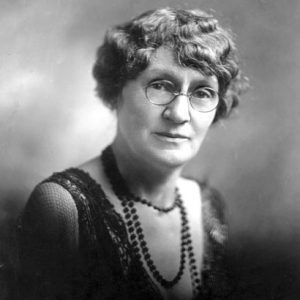calsfoundation@cals.org
Florence Lee Brown Cotnam (1865–1932)
Florence Lee Brown Cotnam was a leader in the women’s suffrage movement in Arkansas, representing the state by speaking for women’s suffrage across the nation. After women received the vote, Cotnam continued the cause of women by serving as the first president of the Little Rock League of Women Voters.
Florence Lee Brown was born to Tarleton Woodson Brown and Eliza Webb Thurmond on April 16, 1865, in Cobham, Virginia. She had one sibling, Sue Brown. Florence Brown was educated in private schools in Gordonsville and Richmond, Virginia, and at the Charnwood Institute in Tyler, Texas, where she met Thomas Taylor Cotnam, an insurance agent. They were married on October 20, 1885, and had three children: Charles, Nell, and Thomas Tarleton.
After moving with her family to Little Rock (Pulaski County) in the 1890s, Cotnam built a reputation for public speaking in the various groups she joined, which included the Aesthetic Club of Little Rock, the Edelweiss Club, and the League of American Pen Women. All three women’s clubs emphasized writing manuscripts and public speaking. In 1915, her speaking talent helped elect her president of the Little Rock Political Equality League. In 1914, other local suffrage organizations joined with the Little Rock Political Equality League to create the Arkansas Woman Suffrage Association, and Cotnam was elected treasurer. In 1917, it became known as the Equal Suffrage State Central Committee. The association sent Cotnam on a speaking tour as its contribution to the national campaign for women’s right to vote. The Arkansas Gazette reported that she was the speaker for the affirmative position in a women’s suffrage debate in Fairmont, West Virginia, and later in Atlantic City, New Jersey.
From 1915 to 1920, Cotnam spoke in more than twenty states. The Arkansas Gazette reported that Cotnam became the first woman to address the Arkansas General Assembly on February 5, 1915. She addressed the future of the women’s suffrage movement at the vote of the primary suffrage measure and again at the signing of the primary suffrage legislation, which allowed women to vote in the state primaries.
Once female suffrage was achieved by federal amendment in 1920, Cotnam worked to educate women on their new responsibility as voters. She offered women basic classes on their rights of citizenship, especially the vote. After women achieved right to vote, local women organized the League of Women Voters of Little Rock to promote political responsibility. Cotnam was elected president of this new organization and was asked to address the National League of Women Voters Convention in Chicago on February 14, 1920. She spoke on the struggle to achieve voting rights in her speech titled “All’s Well That Ends Well.”
Pursuant to the league’s goal to educate women about citizenship and voters’ rights, Cotnam worked to enroll women in citizenship study clubs. By doing so, she helped educate women so they could exercise their new voting rights. The citizenship clubs inspired women to push for new labor laws, equal pay for equal work, and child labor laws.
Florence Brown Cotnam was editor in 1928 of Homemakers, a magazine published by Little Rock Clubwomen. She was an active member of the Arkansas Democratic Women’s Club and the Arkansas Democratic Central Committee and was a delegate from Arkansas to the National Democratic Convention in Chicago in 1932. Cotnam continued her public speaking until her death on October 7, 1932. She was buried at Roselawn Memorial Park.
For additional information:
Craig, Jared B. “Political Animal: Florence Brown Cotnam and the Arkansas Women’s Suffrage Movement.” MA thesis, University of Arkansas at Little Rock, 2017.
Harper, Clio. History of the Arkansas Press Association: With Which is Included an Authorized “Who’s Who” in Arkansas Journalism. Little Rock: Arkansas Press Association, 1930.
“Mrs. T. T. Cotnam, Civic Leader, Dies.” Arkansas Gazette. October 8, 1932, pp. 1, 22.
Who’s Who in Little Rock, Nineteen Hundred and Twenty-one : An Accurate Biographical Record of Men and Women of Little Rock, Ark., Prominent in Various Lines of Civic Activity. Little Rock: Who’s Who Press, 1921.
Paula Kyzer Taylor
Arkansas History Commission
 Florence Cotnam
Florence Cotnam 



Comments
No comments on this entry yet.